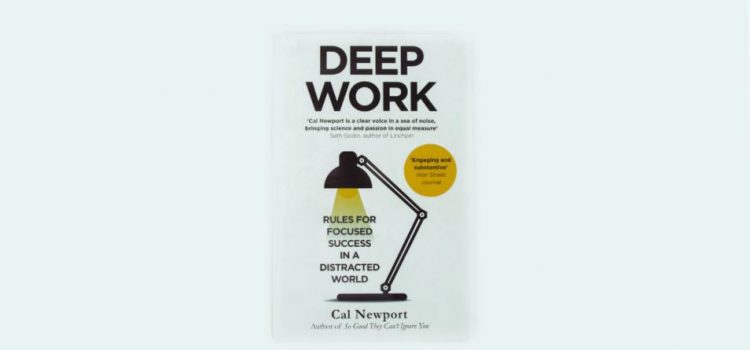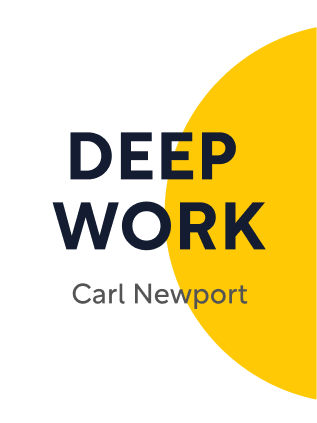

This article is an excerpt from the Shortform book guide to "Deep Work" by Cal Newport. Shortform has the world's best summaries and analyses of books you should be reading.
Like this article? Sign up for a free trial here .
Thinking about reading Deep Work by Cal Newport but want to know more about the book first? How was the book received when it came out? Do Newport’s methods work?
Cal Newport’s book Deep Work teaches rules that readers can use to optimize their days and become more productive. His method is to split your day into chunks of time and to learn to focus on a single task at a time.
This Deep Work review takes a look at the book’s context, background, and critical reception
Deep Work by Cal Newport
“Deep work”—totally focused, undistracted work—is the way to thrive in today’s information economy, explains professor Cal Newport in Deep Work. His method of blocking off chunks of time to focus intensely on a single task strengthens your ability to learn difficult things quickly and optimize your output—both of which are key skills for knowledge workers, or those who work with information. He explains why deep work is so valuable and then helps you design your life to allow more time for deep work.
About the Author
Cal Newport is a professor of computer science at Georgetown University. He’s published eight books. His first three books focus on advice for students: How to Win at College, How to Become a Straight-A Student, and How to Be a High School Superstar. In 2007, in tandem with his work on these books, he started his popular blog, Study Hacks. The blog aims to help students do focused, meaningful schoolwork while managing the ever-growing presence of distracting technology.
Newport then pivoted toward writing about business and has published four books on the subject: So Good They Can’t Ignore You, Deep Work, Digital Minimalism, and A World Without Email. He’s also published The Time-Block Planner, a companion to his books that helps readers apply his principles and mindfully plan their days.
Newport regularly writes about deep work, digital use, and distraction for publications including The New Yorker and The New York Times.
Newport lives by his digital minimalism principles—he doesn’t appear on any social media, save for a single tweet that reiterates his dedication to deep work:
The Book’s Publication
Publisher: Grand Central Publishing, Hachette Book Group
Published in 2016, Deep Work is Newport’s fifth book. It’s since earned a spot as a Wall Street Journal Business Bestseller.
The Book’s Context
Deep Work came out at a time when many other authors were writing on similar subjects—how to stand out, how to get focused, how to live in the present, how to get a handle on technology’s place in our lives—and people were seeking out such books for answers.
In the book’s publication year, 2016, New York Times bestseller lists (general and business) included books touching on related topics, such as The Revenge of Analog, The Power of Habit, Originals, and Outliers. Business Insider’s bestsellers list included titles such as Tools of Titans and Smarter Faster Better.
The Book’s Strengths and Weaknesses
Deep Work reviews are fairly evenly split between positive and negative.
Positive reviewers, many of whom credit Newport’s ideas with helping them work through procrastination or focus issues, agree that his ideas are invaluable to learning how to climb to the top in our current information economy. They note that the book feels like much more than a collection of tired productivity hacks—rather, it reads as a guide to overhauling foundational aspects of your life, such as your schedule, to create far-reaching changes.
On the other hand, negative reviewers commonly bring up several points of criticism. First, they note that Newport seems unaware of the unique privileges that allow him to do deep work, such as the flexibility of his academic job and a deep work activity that’s relatively accessible—all you need is a laptop. Thus, while Newport may do a good job laying out the importance of deep work and describing ideal conditions for it, critics say he falls short of giving actionable advice for typical knowledge workers, who have less control over their work and schedules than a professor has.
Finally, many reviewers point out apparent sexism in Newport’s examples—almost all of his examples of people excelling in deep work are men, and he seems to reserve female-centered examples for explanations of what not to do. (Note: Because we don’t use Newport’s examples, we don’t directly address this criticism in this guide. However, it comes up frequently enough in reviews of the book that it bears mention.)
Commentary on the Book’s Approach
Numerous reviewers compare Newport’s writing to that of Malcolm Gladwell, author of popular psychology books like Outliers and Blink. Like Gladwell, he brings the concepts he discusses to life with interesting case studies and entertaining anecdotes. This accessible style helps readers connect with tricky ideas around the value of focus, and it illustrates the powerful effect that undistracted work can have on a career—especially in a world where many consider multitasking a superpower.
Commentary on the Book’s Organization
In the first part of his book, Newport explains the philosophy of deep work and why it’s an invaluable skill for knowledge workers. In the second part, he explains different “rules” that help readers optimize their days and carve out more time for deep work.
- Numerous critical reviews note that the three first chapters are interesting but become somewhat repetitive. They also note that in later chapters, Newport’s “rules” tend to drag on or lack substance.

———End of Preview———
Like what you just read? Read the rest of the world's best book summary and analysis of Cal Newport's "Deep Work" at Shortform .
Here's what you'll find in our full Deep Work summary :
- How deep work is critical for performance and productivity
- Why focus is like a mental muscle
- Why willpower isn't as good as a ritual






